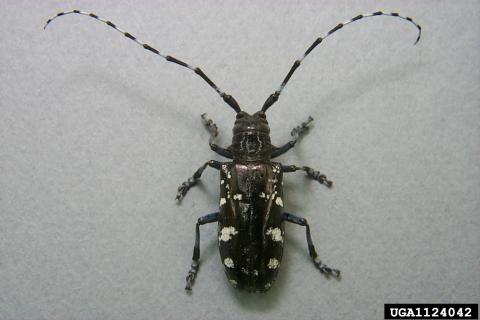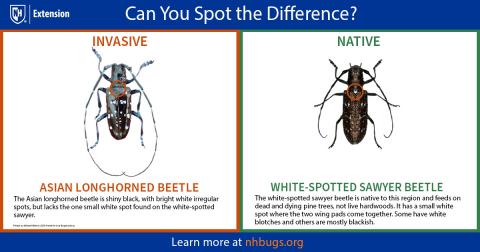
Photo: Donald Duerr, USDA Forest Service, Bugwood.org
We need your help to look for Asian longhorned beetles (ALB). UNH Extension is asking New Hampshire residents with pools to check their filters regularly for ALB. Pool filters naturally gather an assortment of bugs making it easier to keep an eye out for ALB. If you don’t have a pool you can still help by keeping a lookout where you live. ALB hasn't been found in New Hampshire as of today.
ALB poses a serious risk to trees and forests because it attacks many kinds of hardwood trees. The white-spotted sawyer beetle is a common and native look-alike often confused for ALB. However, there is a fool-proof way to tell the two apart. ALB is shiny black, with bright white irregular spots, but lacks the one small white spot found on the white-spotted sawyer. The white-spotted sawyer beetle is native to this region and feeds on dead and dying pine trees, not live hardwoods. It has a small white spot where the two wing pads come together. Some have white blotches and others are mostly blackish.

How can you help look for ALB?
What you Need:
- A smartphone (or other mobile device) or digital camera.
- An email address that you actively use.
- A computer to upload pictures to our online reporting system.
Step 1: Search your pool filter for Asian longhorned beetle
ALB adults are active during the summer, mid-July through the end of August. Whenever you clean your pool, look at the debris you collect in your filter and skimmers. Look for longhorned beetles.
Step 2: Compare what you find to insects similar to ALB
Use a fact sheet to compare collected insects to common insects.
Step 3: Take a picture
Take a picture of any insect you think is a longhorned beetle. We need a good view of the insect's back to properly identify it.
Step 4: Send us your pictures
Upload pictures of the insect using the online reporting form.
Find more information about Asian longhorned beetle and other invasive insects at www.NHBugs.org.
Have a question about your woods? Contact your Extension County Forester today!
Do you love learning about stuff like this? Subscribe to the NH Woods & Wildlife Newsletter.
A quarterly newsletter providing private woodlot owners in New Hampshire with woodlot management news, pest updates, resources, and more.

